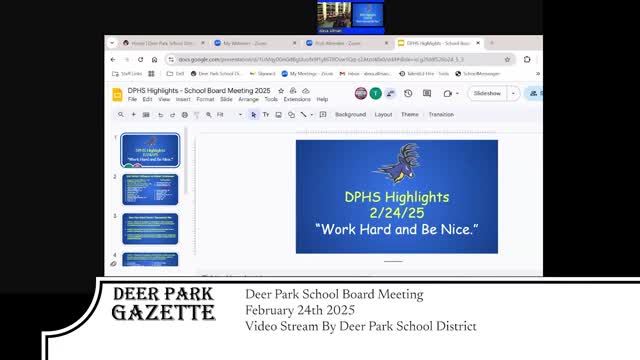Deer Park High administrators outline classroom, discipline and student‑support priorities
Get AI-powered insights, summaries, and transcripts
Subscribe
Summary
Deer Park High School administrators Troy and Chad presented a plan emphasizing teacher collaboration, common assessments, a new phone and hall‑pass system, targeted interventions and expanded college‑credit classes.
Troy, an administrator at Deer Park High School, and Chad, an administrator at Deer Park High School, told the Deer Park School Board that their priorities this year are collective teacher efficacy, clearer common assessments and programs to connect struggling students with supports.
The administrators said those steps — combined with a new classroom cellphone policy and a cloud‑based hall‑pass system — are intended to improve student learning and safety and to boost student engagement.
The presentation outlined a research foundation and operational changes the administrators say have guided planning this year. Troy highlighted research showing “collective teacher efficacy” as the highest‑impact factor in student growth, telling the board the top research measure was “1.57,” and noting that “0.4 … is basically student growth over 1 year.” He said the school is using that idea to align staff around common goals and expectations.
Troy and Chad described specific academic practices in use or being expanded: professional learning community (PLC) time on Wednesday mornings, common formative assessments given across multiple teachers, grade‑level meetings to review students who are struggling, and ongoing intervention meetings for special education and student success teams. Chad said the school has shifted from focusing on ninth grade only to holding grade‑level meetings so teachers who instruct the same grades can coordinate and share data.
Chad described classroom and operational changes aimed at improving attention and safety. He said Deer Park implemented a stricter cellphone policy and is rolling out a cloud‑based hall‑pass program (referred to in the presentation as a “pick my kid” / hall pass system) to track student check‑ins and check‑outs in real time. Chad told the board the hall pass logs student movement by number rather than name and that reports can be run for parents and staff; he added the system includes an emergency reunification function to help account for students in a crisis.
Administrators also reviewed student support programs: a homework center run by Leslie Hills that is open after school with three staff members available; a new lunch‑intervention program for students with multiple missing assignments; and a contract grading process that lets students close marginal failing grades by meeting agreed improvement targets. Chad said eight students used the contract process in the first semester and that overall first‑semester class pass rates in the building were about 96 percent.
On inclusion, administrators said the math department is exploring restructuring smaller “lab” classes so students with accommodations can be placed with grade‑level peers whenever possible. They said the goal is to reduce small, low‑enrollment lab sections and provide more algebra and geometry classes that include students with individualized education program (IEP) supports.
The school also plans to expand college‑credit opportunities. Troy said the district is adding a college‑credit economics class and allowing Algebra II and some trade classes to be offered for college credit next year, with standard passing and sequencing requirements for enrollment.
Administrators reviewed student‑wellbeing efforts including Link Crew (a peer mentoring program for ninth graders), monthly assemblies and “staff one‑on‑ones” the principal said he holds to support staff morale. They described a student advisory group used to gather authentic student feedback on policies such as the cellphone rule and bathroom concerns. Chad described routine gestures of recognition — staff‑sent note cards, lunchtime slideshow recognitions and “priority parties” to highlight students who improved academically — as part of an effort to boost belonging.
Extracurricular updates included state‑level qualifiers in DECA, SkillsUSA and FFA; athletics finishes at state for wrestling and basketball; and a pep band that, administrators said, attends many events and helps game‑day atmosphere.
The presentation concluded with an invitation for questions; a speaker identified on the record as Christina praised the new admin team and their relationships with staff.
The administrators used research citations and several program names during the presentation. Board members and members of the public asked clarifying questions about the hall‑pass vendor, data privacy (the administrators said data are stored in the cloud and identified by number), transportation to after‑school programs (not provided), and whether freshmen could enroll in college‑credit courses (answer: possible once students reach the required sequencing).
